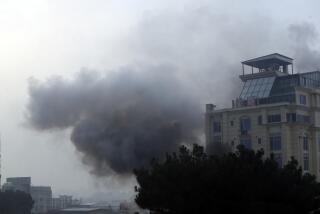Alleged U.S. Vigilante a Man of Mystery
- Share via
KABUL, Afghanistan — The Americans in combat fatigues kicked in the door at the home of the Afghan high court’s chief judge, fired warning shots into the walls, trussed up the jurist and seven other men and whisked them off to jail.
There, one of the captives said, the men were doused with cold water, deprived of food and grilled about terrorism.
This was no ordinary raid, though. The men who nabbed the suspects are also in jail, accused of impersonating American operatives and imprisoning innocent people at a private jail during an illegal vigilante campaign in Afghanistan.
Their leader is Jonathan Keith Idema, who goes by “Jack.” He is a well-known figure from the 2001 Afghan war and something of an international man of mystery. A convicted felon, former Special Forces soldier and plaintiff against Fox News and Steven Spielberg’s DreamWorks company, Idema contended that he and his team of Americans and Afghans were closing in on Al Qaeda leader Osama bin Laden. Among those arrested with him by Afghan police two weeks ago was a former television news cameraman who was in Afghanistan to record Idema’s exploits.
Idema’s attorney said his client had been handing over suspected terrorists to American Special Forces for months, and strongly denied that any of the suspects held by Idema’s team were abused. In a Kabul courtroom Sunday, Idema said the Pentagon was aware of his activities.
He demanded that a cameraman stop filming him because, he said, Bin Laden had put a bounty on his head.
The judge handling the case said five of the original Afghan prisoners, including the chief judge, were still being held “to get some additional information” and would be released soon, Associated Press reported.
The case comes as the U.S. tries to overcome prison scandals in Iraq and Afghanistan. The American military is investigating the deaths of three prisoners at Afghan detention facilities, and rumors of abuse ripple throughout Afghanistan. The most recent rumor, denied by the U.S. military and Afghan government but widely repeated throughout Kabul by angry residents, is that American soldiers raped five Afghan men working as translators.
The U.S. government has distanced itself from Idema, 48, saying he was operating on his own. And after announcing his arrest and saying that all the Afghans taken in the raid would be freed, the Afghan government has largely been silent about the matter.
It all confuses Ansarullah Said, office administrator for the chief judge of the Afghan high court, who has spent the last several weeks trying to figure out why jurist Siddiq Ullah was arrested and is still being held.
“We don’t know why these unknown American people come to Afghanistan. Who are they?” Said asked. “What do they want? Most of the Afghan people are very unhappy about this.”
The situation also baffles many of Idema’s local allies from the 2001 war against the Taliban, warlords influential in the new Afghan government who fought alongside the former soldier and assumed that he worked for American intelligence services.
Gul Haider, who battled beside Idema three years ago and is now a power broker in Kabul, the Afghan capital, said the American had regularly stopped by his compound here for glasses of tea. “His only words were, ‘Where is Al Qaeda?’ ” Haider said. “He told me he arrested a group of Al Qaeda people, but I never asked where he put them.”
Idema is no stranger to the limelight, or a courtroom. The Poughkeepsie, N.Y., native served three years in a Special Forces unit before leaving to start a military and paintball supply company. Federal authorities charged that he defrauded his suppliers to keep the business going, and according to news reports, Idema was convicted of wire fraud and in 1994 was sentenced to four years in prison.
Timothy Connolly, then U.S. assistant secretary of Defense, asked the judge for leniency on Idema’s behalf, according to the former soldier’s current attorney, John Tiffany, and news accounts. But Idema served three years in prison.
Tiffany contends that Idema was framed by federal agents envious of his intelligence connections and his time tracking smuggled nuclear arms in Lithuania. (It was that chapter in his life that led to the former soldier’s ongoing suit against DreamWorks for allegedly basing its 1997 nuclear thriller starring George Clooney, “The Peacemaker,” on Idema’s investigations.)
After the Sept. 11 attacks, Idema tried to reenlist, according to his attorney. When the military appeared to be dragging its feet, Idema set out for Afghanistan on his own to offer his services to the Northern Alliance, an Afghan coalition allied with the U.S. in the 2001 war.
Idema became a familiar figure to journalists in Kabul, offering to organize convoys to the mountain redoubt of Tora Bora, where Bin Laden was reportedly holed up, and appearing on “60 Minutes” to publicize an Al Qaeda training video he said he had located. His suit against Fox News contends that it ran the video more times than he had agreed. Idema’s bare-chested picture graced the cover of a best-selling book about Green Berets in Afghanistan, “The Hunt for Bin Laden,” which according to some accounts he helped write.
Tiffany said Idema returned to Afghanistan last year to resume the hunt. “Any contention that [U.S. and Afghan authorities] were not aware of what was going on with Jack in Afghanistan is ridiculous,” Tiffany said in a telephone interview from New York. “Everyone knew Jack.”
North Atlantic Treaty Organization forces assisted Idema during at least three raids late last month, arriving to search for explosives. They found traces at two houses that Idema’s team had entered and “unusual” electronic equipment at a third, according to Cmdr. Chris Henderson, a spokesman for NATO-led peacekeeping forces in Afghanistan.
But Henderson said NATO forces were duped into thinking that Idema and his team were with the American military. Early this month, posters began going up around Kabul warning that Idema was pretending he was part of U.S. forces.
Henderson said NATO was not involved in the raid on the home of Ullah, the high court judge.
At about 6 a.m. that day, Idema’s team stormed into the front room of the judge’s mud-brick compound, which adjoins a mosque in the Kabul suburb of Yakatoot. Mohammed Hanif, 19, said he had just arrived to help Ullah build a new room when he and the seven other Afghan men were shoved against the wall by the Americans.
Hanif said the prisoners’ hands were bound and that they spent several hours standing first in the entry room, then the sunny courtyard, before hoods were dropped over their heads and they were driven off.
The prisoners arrived at a house, were laid on the floor and drenched with ice water, Hanif said. They marked time by mosques’ calls to prayer and were fed only after four days had passed. One day, he said, they heard a man in a nearby room being beaten. The man called out that his name was Sher Ali, but the jailers turned on a tape player to drown out his voice. Hanif said none of his group ever saw that prisoner.
One week later, Hanif said, he was separated from the other prisoners and, through an interpreter, asked why he had been in Ullah’s house. Then the Americans asked what he thought of the Taliban -- “bad,” Hanif said -- and of Americans -- “very good,” he said.
Hanif said he was blindfolded, driven to an intersection in Kabul and set free with change for a taxi.
“I don’t know why they came, why they arrested us, and why our other men are still in custody,” Hanif said.
Court officials and neighbors said authorities had told them Ullah and the others were being held by Afghan intelligence.
Ullah was allegedly once a member of Hezb-i-Islami, a radical group that is suspected to be behind some of the attacks on coalition troops in Afghanistan. But friends and neighbors said the jurist was no terrorist sympathizer, and that he had had to flee the Taliban.
More to Read
Sign up for Essential California
The most important California stories and recommendations in your inbox every morning.
You may occasionally receive promotional content from the Los Angeles Times.










